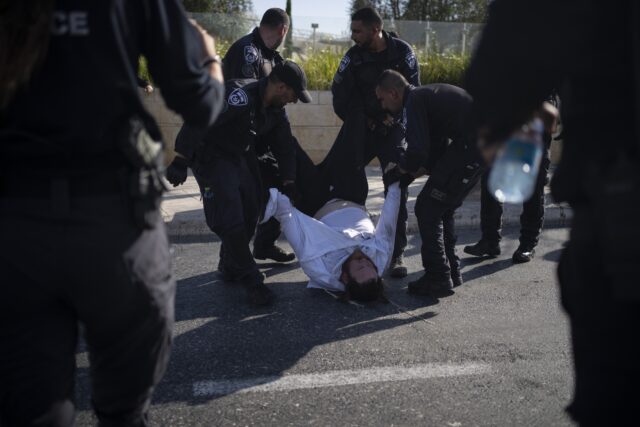Israel’s Supreme Court on Tuesday ruled unanimously that the military must begin drafting ultra-Orthodox men for military service, a decision that could lead to the collapse of Prime Minister Benjamin Netanyahu’s governing coalition as Israel continues to wage war in Gaza
Israeli supreme court says ultra-Orthodox men must serve in militaryBy TIA GOLDENBERGAssociated PressThe Associated PressJERUSALEM
JERUSALEM (AP) — Israel’s Supreme Court on Tuesday ruled unanimously that the military must begin drafting ultra-Orthodox men for military service, a decision that could lead to the collapse of Prime Minister Benjamin Netanyahu’s governing coalition as Israel continues to wage war in Gaza.
The court ruled that in the absence of a law that distinguishes between Jewish seminary students and other draftees, Israel’s compulsory military service system applies to the ultra-Orthodox like any other citizens.
Under longstanding arrangements, ultra-Orthodox men have been exempt from the draft, which is compulsory for most Jewish men and women. These exemptions have long been a source of anger among the secular public, a divide that has widened during the eight-month-old war, as the military has called up tens of thousands of soldiers and says it needs all the manpower it can get. Over 600 soldiers have been killed.
Politically powerful ultra-Orthodox parties, key partners in Netanyahu’s governing coalition, oppose any change in the current system. If the exemptions are ended, they could bolt the coalition, causing the government to collapse and leading to new elections.
During arguments, government lawyers told the court that forcing ultra-Orthodox men to enlist would “tear Israeli society apart.”
The court decision comes at a sensitive time, as the war in Gaza drags on into its ninth month and the number of dead soldiers continues to mount.
The court found that the state was carrying out “invalid selective enforcement, which represents a serious violation of the rule of law, and the principle according to which all individuals are equal before the law.”
It did not say how many ultra-Orthodox should be drafted.
The court also ruled that state subsidies for seminaries where exempted ultra-Orthodox men study should remain suspended. The court temporarily froze the seminary budgets earlier this year.
In a post on the social media platform X, cabinet minister Yitzhak Goldknopf, who heads one of the ultra-Orthodox parties in the coalition, called the ruling “very unfortunate and disappointing.” He did not say whether his party would bolt the government.
“The state of Israel was established in order to be a home for the Jewish people whose Torah is the bedrock of its existence. The Holy Torah will prevail,” he wrote.
The ultra-Orthodox see their full-time religious study as their part in protecting the state of Israel. Many fear that greater contact with secular society through the military will distance adherents from strict observance of the faith.
Ultra-Orthodox men attend special seminaries that focus on religious studies, with little attention on secular topics like math, English or science. Critics have said they are ill-prepared to serve in the military or enter the secular work force.
Religious women generally receive blanket exemptions that are not as controversial, in part because women are not expected to serve in combat units.
The ruling now sets the stage for growing friction within the coalition between those who support drafting more ultra-Orthodox and those who oppose the idea. Ultra-Orthodox lawmakers are likely to face intense pressure from religious leaders and their constituents and may have to choose whether remaining in the government is worthwhile for them.
Shuki Friedman, vice-president of the Jewish People Policy Institute, a Jerusalem think tank said the ultra-Orthodox “understand that they don’t have a better political alternative, but at same time their public is saying ‘why did we vote for you?’”
The exemptions have faced years of legal challenges and a string of court decisions has found the system unjust. But Israeli leaders, under pressure from ultra-Orthodox parties, have repeatedly stalled. It remains unclear whether Netanyahu will be able to do so again.
Netanyahu’s coalition is buoyed by two ultra-Orthodox parties who oppose increasing enlistment for their constituents. The long-serving Israeli leader has tried to adhere to the court’s rulings while also scrambling to preserve his coalition. But with a slim majority of 64 seats in the 120-member parliament, he’s often beholden to the pet issues of smaller parties.
Netanyahu has been promoting a bill tabled by a previous government in 2022 that sought to address the issue of ultra-Orthodox enlistment.
But critics say that bill was crafted before the war and doesn’t do enough to address a pressing manpower shortfall as the army seeks to maintain its forces in the Gaza Strip while also preparing for potential war with the Lebanese Hezbollah group, which has been fighting with Israel since the war in Gaza erupted last October.
With its high birthrate, the ultra-Orthodox community is the fastest-growing segment of the population, at about 4% annually. Each year, roughly 13,000 ultra-Orthodox males reach the conscription age of 18, but less than 10% enlist, according to the Israeli parliament’s State Control Committee.
__
AP writer Isaac Scharf in Jerusalem contributed to this story.

COMMENTS
Please let us know if you're having issues with commenting.